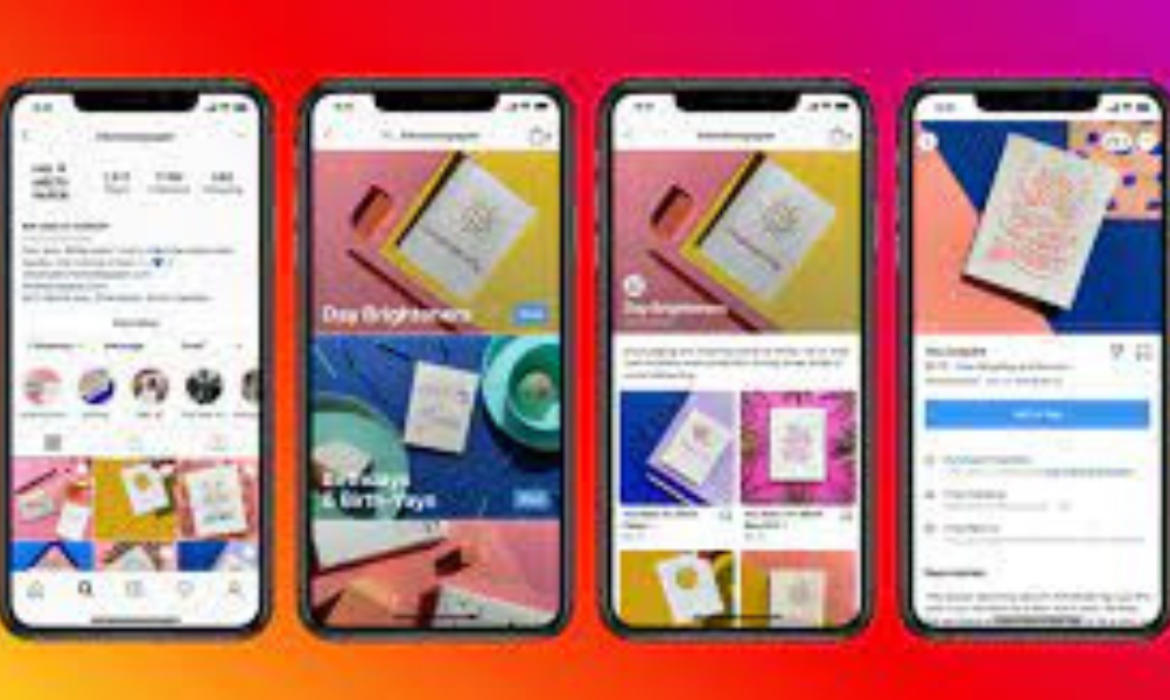Instagram Rolls Out Ad Feature To The Shops Tab Globally
Synopsis:
- Instagram launches the ad feature in the Shops tab globally
- Users can click on the Instagram Shop Advertisment to browse or view product details or save the product to the personal wishlist.
- This marks the latest update of Facebook’s ongoing commercialization strategy to monetize every segment of its social media empire.
Instagram announced the launch of ads in the Shop tab globally, rolling out in countries where Shop Tab has already been in operation. The aim is to earn more advertising dollars from brands hoping to reach new customers. The global roll-out allows brands to showcase their products to a larger audience who are already in a mood to browse.
This marks Instagram’s latest update in the ever-evolving and booming social commerce space. The photo-sharing app already has adverts sprouting on Reels, Stories, individual feeds, or suggested posts. Instagram Shop is a photo and video sharing app tab that allows users to browse items like clothing and beauty products, and let them buy directly through the app.
In the new feature, advertisements will appear as tiles on the Shop Tab, enabling the user to click on the ad and directly navigate to the product detail page, from where the potential buyers can read up and check additional photographs. The user can also browse other products of the respective brand. If a user does not want to purchase the product immediately then can save the details on a personal wishlist or share them with friends.

Credit: Instagram
Instagram has previously tested Shop ads with a few U.S advertisers like Away, Donny, Boo Oh, Clare paint but now is open to brands globally. As reported by Tech Crunch, these ads will launch with an auction-based model and only appear on mobile as Shops is not available on the desktop.
Facebook Debuts Shops In Its Mobile App, Instagram Expands Checkout Feature

Facebook rolled out a shopping section ‘Facebook Shops’ to its main app across the U.S and expanded Instagram’s checkout feature.
The new section Facebook Shops allows users to browse product catalogs from businesses they like, discover new businesses and make purchases, all-in-one place, and without leaving the app. A similar feature ‘ Instagram Shops’ was introduced on its photo-sharing app last month.
The news follows the launch of Facebook Shops in May and on Tuesday it announced a couple of new e-commerce features within its flagship mobile app and Instagram. Businesses were already able to add product catalogs to their Facebook pages but there was no dedicated section inside the app for browsing the selections.
The company explained the rapid shift toward online shopping as a reason to foray into eCommerce.
“During the COVID-19 pandemic, the shift to online shopping has rapidly accelerated, with an estimated 85% of people worldwide now shopping online.
We want to make shopping easier for people and empower anyone, from an entrepreneur to the largest brand, to use our apps to connect with customers and grow their business.”
Here are the details that will help people to shop on the apps and tools to help businesses sell online.
Shop Till You Drop!
A new ‘Shop’ tab is introduced in the mobile app where businesses can showcase their products and customers can shop them in the app.
“Facebook Shop makes it easy for people to find products from businesses they love, discover new ones and make purchases, all in one place.”
It’s a significant step for Facebook’s eCommerce push, helping users to browse and purchase from shop-enabled Pages directly in the app. Presently, being tested in the US but Facebook said in the coming weeks it will be available to all eligible businesses.

New customization features will also be added to Facebook Shops that includes:
- New design layouts for featuring single products or groups of products in Shops
- Real-time preview of collections as they are designed
- The ability to automatically create Shops for new sellers
- New insights to measure results in Commerce Manager

Expanding Instagram CheckOut
Checkout allows users to pay for items directly inside the app and will soon be available to all businesses in the U.S after keeping the feature exclusive to certain partners for almost 18 months. Though there is a limitation,
To use checkout, businesses must have Shops and use Facebook Commerce Manager or our partners Shopify and BigCommerce. We’ll support more platform partners soon.
It will also provide an incentive by waiving the selling fees for businesses through the end of the year due to the current economic crisis.
Shop Using Messaging
Facebook added a new message option to the shop in order to connect the customers directly to the seller through Messenger, WhatsApp, or Instagram Direct.
“Messaging through Shops combines the in-store experience of being able to ask a salesperson questions with the convenience of online shopping.”

Customers can view the products in the chat and can easily share with friends and family for feedback before any purchase. This feature is now being tested on Messenger and Instagram Direct and will start testing on WhatsApp soon.

This will definitely boost Facebook’s dominant presence in messaging with its eCommerce capacity, providing compelling business opportunities as people are regular users of these messaging apps.
Live Facebook and Instagram Shopping
Another promotional option is Facebook and Instagram live shopping. This means businesses can sell products during a live stream.
“Facebook Live Shopping includes new features to help businesses easily set up a live experience featuring products from their Shop and sell directly from the video.”
Instagram Live Shopping is available to all businesses and creators using checkout in the US.

Video is the most engaging type of content and during the lockdown during the pandemic, the viewership of Facebook live streams had risen 50% since January as people looked for various ways to stay connected and entertained.
The global lockdown has provided a significant opportunity to Facebook’s eCommerce business as more people shifted to online shopping. The social network will soon become an essential part of our day-to-day lives as it prepares to build a commerce eco-system within its own network.
Facebook’s “Shop” Feature Breaks The Wall Between Social Media And Ecommerce
Facebook has recently launched an option of “Shops” on its social networking platform. This Will allow its 2.6 billion users an opportunity to shop while browsing through their favorite social networking website.
As the demand for the e-commerce market rises, Facebook sees this as an opportunity and is ready to cash more money. Facebook “Shops” will provide room to merchants, SMB, and product companies to build a virtual store on Facebook. Facebook is calling it “Social commerce”.
“We want to give people a place to experience the joy of shopping versus the chore of buying. And we want to help small businesses adapt and make it easier for people to discover and shop for things they love,” Facebook said in a press release.
To make things easy and secure, the products that will appear on Facebook and Instagram as the ad will not be linked to any third-party website or server. Instead, it will be linked to a zippy on the Facebook portal which will take the user to a catalogue from where the user can choose or purchase the product. It will also show the saved card details if the user has ever purchased from Facebook or any of its applications.

Image credit- Facebook.
Live shopping experience:
Facebook will also provide live shopping features on its platform. According to Facebook, People have always been showcasing their products in live videos. Now, they can link these products with their store. The products will appear on the bottom of their live feed. By tapping on the product on their screen users can get all the details of the product. Live shopping feature will be available worldwide to its users!

Image credit – Facebook.

Image Credit – Facebook
“Shops” will be an integral part of the Facebook family. Users can save products in their cart on Facebook, and complete the checkout process on Instagram, or vice-versa. Facebook aims to target small vendors for his aspirations, and nearly 1 million users have registered to be a part of this experiment.
The other principal dissimilarity from past commerce enterprise is that Facebook “required the small businesses to go all-in on our tools,” Zuckerberg said.
The platform is free for everyone and Facebook is partnering with other tech giants to provide services at the back-end.

Image credit – Facebook.
Zuckerberg further stated, “Rather than charge for Shops, we know if it’s valuable they’ll want to bid more for ads.”
One of the key partnership deals is made with “Shopify”, According to Facebook, in just a few clicks you can operate a Facebook shops account from Shopify.
Shopify founder and CEO Tobi Lutke said, “It’s an incredible new reality in the retail space to have these tools natively in the Facebook platform,” he further mentioned, for small businesses it’s very crucial to find new customers.
CEO Tobi Lutke added, “Communications is incredibly important, for so long that’s been monopolized by large CPG brands on television.”
According to him instead of going to different levels of media and advertisement, sellers will be able to reach directly to the customer. “The DTC industry, as some people call it, really happened on top of Facebook and Shopify.”
With Facebook focusing more on small scale businesses adding Shopify having the strength of entrepreneurs, the model looks like a rival of Etsy and doesn’t seem to target retail chains like Target.

Image credit – Facebook.
According to the Zukerberg and Lutke analysis, this model will help to empower small-scale businesses. Helping those sellers who are genuine, and want to provide efficient services to their customers. The model will help small businesses to highlight their product in the market without expensive advertising. As most of the small scale businesses can’t afford the luxury of advertisement.

Image credit -Facebook
The users will also be able to earn rewards for their purchase. Rewards will be known as loyalty points. Facebook will motivate the sellers to provide these points to the customer on their purchase. This will help them to lure more customers. Users will be able to easily keep track of their loyalty points.




